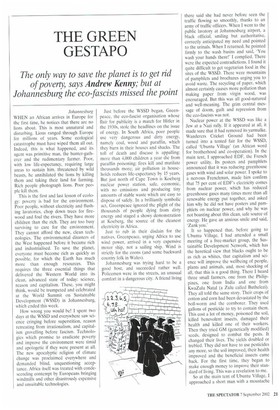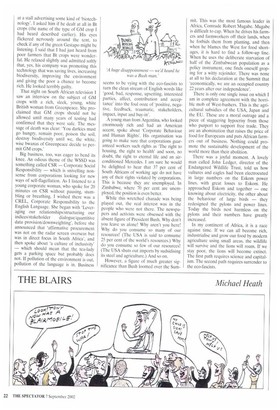THE GREEN GESTAPO
The only way to save the planet is to get rid
of poverty, says Andrew Kenny; but at
Johannesburg the eco-fascists missed the point
Johannesburg WHEN an African arrives in Europe for the first time, he notices that there are no lions about. This is most unnatural and disturbing. Lions ranged through Europe for millions of years. Some ecological catastrophe must have wiped them all out. Indeed, this is what happened, and its agent was primitive man, the hunter-gatherer and the rudimentary farmer. Poor, with low life-expectancy, requiring large areas to sustain him, threatened by wild beasts, he annihilated the lions by killing them and taking their land for farming. Rich people photograph lions. Poor people kill them.
This is the first and last lesson of ecology: poverty is bad for the environment. Poor people, without electricity and flushing lavatories, chop down trees for firewood and foul the rivers. They have more children than the rich. They are too busy surviving to care for the environment. They cannot afford the new, clean technologies. The environmental disasters of the West happened before it became rich and industrialised. To save the planet, everyone must become rich as quickly as possible, for which the Earth has much more than enough resources. This requires the three essential things that delivered the Western World into its clean, advanced state of today: science, reason and capitalism. These, you might think, would be trumpeted and celebrated at the World Summit on Sustainable Development (WSSD) in Johannesburg, which ended this week.
How wrong you would be! I spent two days at the WSSD and everywhere saw science cringing before superstition, reason retreating from irrationalism, and capitalism grovelling before fascism. Technologies which promise to eradicate poverty and improve the environment were timid and apologetic if they were present at all. The new apocalyptic religion of climate change was proclaimed everywhere and demanded blind, unquestioning acceptance. Africa itself was treated with condescending contempt by Europeans bringing windmills and other disastrously expensive and unsuitable technologies. Just before the WSSD began, Greenpeace, the eco-fascist organisation whose flair for publicity is a match for Hitler in the 1930s, stole the headlines on the issue of energy. In South Africa, poor people use very dangerous and dirty energy, namely coal, wood and paraffin, which they burn in their houses and shacks. The toll of death and disease is appalling: more than 4,000 children a year die from paraffin poisoning; fires kill and mutilate thousands more; air pollution in households reduces life-expectancy by 15 years. But just north of Cape Town is Koeberg nuclear power station, safe, economic, with no emissions and producing tiny amounts of stable waste which are easy to dispose of safely. In a brilliantly symbolic act, Greenpeace ignored the plight of the thousands of people dying from dirty energy and staged a showy demonstration at Koeberg, the source of the cleanest electricity in Africa.
Just to rub in their disdain for the natives. Greenpeace, urging Africa to use wind power, arrived in a very expensive motor ship, not a sailing ship. Wind is strictly for the coons (and some backward country folk in Wales).
Johannesburg was trying hard to be a good host, and succeeded rather well. Policemen were in the streets, an unusual comfort in a dangerous city. A friend living there said she had never before seen the traffic flowing so smoothly, thanks to an army of traffic officers. When I went to the public lavatory at Johannesburg airport, a black official, smiling but authoritative, correctly anticipated my need and pointed to the urinals. When I returned, he pointed firmly to the wash basins and said, 'You wash your hands there!' I complied. There were the expected contradictions. I found it quite difficult to get vegetarian food in the sites of the WSSD. There were mountains of pamphlets and brochures urging you to avoid waste. The recycling of paper, which almost certainly causes more pollution than making paper from virgin wood, was encouraged. But this was all good-natured and well-meaning. The grim central message of doom, guilt and repression from the eco-fascists was not.
Nuclear power at the WSSD was like a Jew at a Nazi rally. If it appeared at all, it made sure that it had removed its yarmulke. Wanderers Cricket Ground had been turned into a tented fair for the WSSD, called `Ubuntu Village' (an African word for brotherhood and co-operation). In the main tent, I approached EDF, the French power utility. Its posters and pamphlets announced that it was reducing greenhouse gases with wind and solar power. I spoke to a nervous Frenchman, made him confirm that 75 per cent of EDF.s electricity comes from nuclear power, which has reduced greenhouse gases many times more than all renewable energy put together, and asked him why he did not have posters and pamphlets on nuclear power, and why he was not boasting about this clean, safe source of energy. He gave an anxious smile and said, `Zank you.'
It so happened that, before going to Ubuntu Village, I had attended a small meeting of a free-market group, the Sustainable Development Network, which has the heretical view that blacks ought to be as rich as whites, that capitalism and science will improve the wellbeing of people, plants and animals, and, most shocking of all, that this is a good thing. There I heard three small farmers, one from the Philippines, one from India and one from KvvaZulu Natal (a Zulu called Buthelezi). They all told the same story. Their crops of cotton and corn had been devastated by the boll-worm and the cornborer. They used gallons of pesticide to try to contain them. This cost a lot of money, poisoned the soil, killed benevolent insects, damaged their health and killed one of their workers. Then they tried GM (genetically modified) seeds, designed to combat the pests. It changed their lives. The yields doubled or trebled. They did not have to use pesticides any more, so the soil improved, their health improved and the beneficial insects came back. For the first time, they began to make enough money to improve their standard of living. This was a revelation to me.
So at the main tent of Ubuntu Village, I approached a short man with a moustache at a stall advertising some kind of 'biotechnology'. I asked him if he dealt at all in BE crops (the name of the type of GM crop I had heard described earlier). His eyes flickered nervously around the tent, to check if any of the green Gestapo might be listening. I said that I had just heard from poor farmers that Bt crops were wonderful. He relaxed slightly and admitted softly that, yes, his company was promoting this technology that was saving lives, increasing biodiversity, improving the environment and giving the poor a chance to become rich. He looked terribly guilty.
That night on South African television I saw an interview on the subject of GM crops with a rich, sleek, young, white British woman from Greenpeace. She proclaimed that GM crops should not be allowed until many years of testing had confirmed that they were safe. The message of death was clear: 'You darkies must go hungry, remain poor, poison the soil, destroy biodiversity until we, the white, wise bwanas of Greenpeace decide to permit GM crops.'
Big business, too, was eager to bend its knee. An odious theme of the WSSD was something called CSR — Corporate Social Responsibility — which is snivelling nonsense from corporations looking for new ways of self-flagellation. As I listened to a young corporate woman, who spoke for 20 minutes on CSR without pausing, stumbling or breathing, I wished there was a CREL, Corporate Responsibility to the English Language. She began with 'Leveraging our relationships/structuring our indices/stakeholder dialogue/quantitive data provision/downweighting', before she announced that 'affirmative procurement was not on the radar screen overseas but was in direct focus in South Africa', and then spoke about 'a culture of inclusivity' — which should mean that the tea-lady gets a parking space but probably does not. If pollution of the environment is out, pollution of the language is in. Business seems to be vying with the eco-fascists to turn the clean stream of English words like 'good, bad, response, upsetting, interested parties, affect, contribution and acceptance' into the foul ooze of 'positive, negative, feedback, traumatic, stakeholders, impact, input and buy-in'.
A young man from Argentina, who looked enormously rich and had an American accent, spoke about 'Corporate Behaviour and Human Rights'. His organisation was going to make sure that corporations guaranteed workers such rights as 'The right to housing, the right to health' and soon, no doubt, the right to eternal life and an airconditioned Mercedes. I am sure he would be delighted to hear that 37 per cent of South Africans of working age do not have any of their rights violated by corporations. This is because they are unemployed. In Zimbabwe, where 70 per cent are unemployed, the position is even better.
While this wretched charade was being played out, the real interest was in the people who were not there. The newspapers and activists were obsessed with the absent figure of President Bush. Why don't you leave us alone! Why aren't you here! Why do you consume so many of our resources! (The USA is said to consume 25 per cent of the world's resources.) Why do you consume so few of our resources! (The USA shuts out imports by sudsidising its steel and agriculture.) And so on.
However, a figure of much greater significance than Bush loomed over the Sum
mit. This was the most famous leader in Africa, Comrade Robert Mugabe. Mugabe is difficult to cap. When he drives his farmers and farmworkers off their lands, when he forbids them from planting, and then when he blames the West for food shortages, it is hard to find a follow-up line. When he uses the deliberate starvation of half of the Zimbabwean population as a policy instrument, one finds oneself groping for a witty rejoinder. There was none at all to his declaration at the Summit that 'economically, we are an occupied country 22 years after our independence'.
There is only one single issue on which I am in complete agreement with the horrible mob of West-bashers. This is the agricultural subsidies of the USA, Japan and the EU. These are a moral outrage and a piece of staggering hypocrisy from those who purport to support free trade. They are an abomination that raises the price of food for Europeans and puts African farmers out of business. Nothing could promote the sustainable development of the world more than their abolition.
There was a joyful moment, A lovely man called John Ledger, director of the Endangered Wildlife Trust, told us how vultures and eagles had been electrocuted in large numbers on the Eskom power lines, with great losses to Eskorn.He approached Eskom and together — one knowing about electricity, the other about the behaviour of large birds — they redesigned the pylons and power lines. Today the birds nest harmless on the pylons and their numbers have greatly increased.
In my continent of Africa, it is a race against time. If we can all become rich, industrialise and grow our food by modern agriculture using small areas, the wildlife will survive and the lions will roam. If we stay poor, the lions will become extinct. The first path requires science and capitalism. The second path requires surrender to the eco-fascists.



























































 Previous page
Previous page